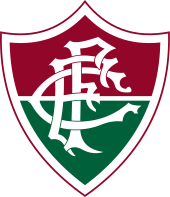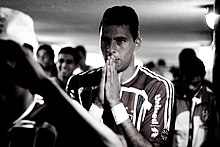Fluminense Rio de Janeiro
| Fluminense Rio de Janeiro | |||

|
|||
| Basic data | |||
|---|---|---|---|
| Surname | Fluminense Football Club | ||
| Seat | Rio de Janeiro , Brazil | ||
| founding | July 21, 1902 | ||
| president | Pedro Abad | ||
| Website | fluminense.com.br | ||
| First soccer team | |||
| Head coach | Marcão | ||
| Venue | Maracanã | ||
| Places | 78,838 | ||
| league | Série A | ||
| 2019 | 14th place | ||
|
|
|||
The Fluminense Football Club , usually only briefly referred to as Fluminense , also known in German-speaking countries as Fluminense Rio de Janeiro , is the oldest football club in the Brazilian metropolis of Rio de Janeiro . It was founded on July 21, 1902 by the Anglo-Brazilian Oscar Cox .
To date, Fluminense is one of the most important football clubs in the country and has won four national championships. The club has since opened to numerous other sports and was awarded the Coupe Olympique , the Olympic Cup, by the International Olympic Committee in 1949 for its services to the sport .
Fluminense is also the name for the residents of the state of Rio de Janeiro .
The club's biggest rivals are the three other big clubs from Rio de Janeiro: CR Flamengo , Botafogo FR and Vasco da Gama . The games against Botafogo are referred to as Clássico Vovô (Grandpa Classic), as this is considered the oldest derby in Rio. The first game between the clubs was played on October 22, 1905 and ended 6-0 for FLU.
Fluminense is the team from Rio that after Flamengo was the second most frequent winner of the championship of the state of Rio de Janeiro ( Campeonato Carioca ) with 31 times .
In their stadium ( Laranjeiras ) the Brazilian national team achieved their first important victories. Of the 18 games played there, she won 15 and drew three times. In Laranjeiras, the national team learned to be big and to be seen big. This is also where the organizational base of Brazilian football was created. The first Fluminense teams used white and gray jerseys. In 1903 Fluminense changed to its current traditional colors of dark red, white and green, which have since become the club's official colors.
Emergence
Oscar Cox was the first to bring football to Rio. He previously played football during his studies in Switzerland and when he returned to Rio he found some men who wanted to play this new, unknown sport with him. After a few games in Rio and São Paulo, they decided to found a new club. Fluminense was founded on July 21, 1902 by Oscar Cox as the first football club in Rio de Janeiro.
The first game took place on October 19, 1902 at the Paysandu Cricket Club against the Rio Football Club, with Fluminense winning 8-0. In the four first Campeonato Carioca (Rio de Janeiros League) 1906-1909 Fluminense was each cup winner.
In 1911 Fluminense was again champion. This year, however, there was a major crisis within the club. After they could not agree on a new coach, nine players left the team. These nine key players decided to switch to Flamengo, which was then just a rowing club. With the creation of Flamengo's football division earlier this year, they started perhaps the most significant Brazilian football rivalry, namely the so-called Fla-Flu . The first Fla-Flu took place on July 7, 1912. Although Flamengo played nine out of eleven players who became champions with Fluminense in 1911 (only Oswaldo Gomes and James Calvert for Fluminense), Fluminense won 3-2.
Fans
The fans call themselves Tricolores , a reference to the three team colors red, white and green. One of the most famous team chants is A Bênção, João de Deus (Bless Us, John of God), a song composed in honor of the Pope on his first visit to Brazil.
Attendance records
The size of the Maracanã allowed for some outstanding audience numbers:
- 194,603, December 15, 1963, Fluminense 0-0 Flamengo
(177,656 paying viewers) - 171.599, June 15, 1969, Fluminense - Flamengo 3: 2
- 160,000, June 27, 1971, Fluminense 1-0 Botafogo
(142,339 paying viewers) - 155.116, May 16, 1976, Fluminense 0-0 Flamengo
- 153.520, December 16, 1984, Fluminense 1-0 Flamengo
- 146.043, December 5, 1976, Fluminense - Corinthians 1: 1
Source: RSSSF Fluminense viewers
title
International
- World Cup : 1952 Copa Rio
- Trofeo Teresa Herrera : 1977
- Copa Libertadores : Finalist 2008
- Copa Sudamericana : 2009 finalist
National
- Masters of Brazil : 1970, 1984, 2010, 2012
- Primeira Liga do Brasil: 2016
- Brazilian Cup : 2007
- Torneio Rio-São Paulo : 1957, 1960
- Taça Ioduran : 1919 (without a fight)
-
National Championship of Rio de Janeiro : (31 ×) 1906, 1907, 1908, 1909, 1911, 1917, 1918, 1919, 1924, 1936, 1937, 1938, 1940, 1941, 1946, 1951, 1959, 1964, 1969, 1971, 1973, 1975, 1976, 1980, 1983, 1984, 1985, 1995, 2002, 2005, 2012
- Torneio Extra: 1941
- Torneio Aberto: 1935
- Torneio Municipal: 1938, 1948
- Torneio Aberto: 1935
- Torneio Extra: 1941
- State Cup of Rio de Janeiro : 1988
- Taça Guanabara : 1966, 1969, 1971, 1975, 1983, 1985, 1991, 1993, 2012, 2017
- Taça Rio : 1990, 2005, 2018, 2020
Known players
Record player
- 319 goals: Waldo
- 188 goals: Orlando Pingo de Ouro
- 165 goals: Telê Santana
- 164 goals: Hércules de Miranda
- 163 goals: Henry Welfare
- 696 games: Carlos José Castilho
- 604 games: João Carlos Batista Pinheiro
- 556 games: Telê Santana
- 551 games: Altair Gomes de Figueiredo
- 490 games: Escurinho
Other well-known players
Source: rsssfbrasil.com: Fluminense international
Trainer
-
 Ondino Viera (1938-1941)
Ondino Viera (1938-1941) -
 László Székely
László Székely
-
 Telê Santana (1969–1970)
Telê Santana (1969–1970) -
 Mário Zagallo (1970–1971)
Mário Zagallo (1970–1971) -
 Carlos Alberto Parreira (1975–1978, 1984–1985, 1999–2000, 2009)
Carlos Alberto Parreira (1975–1978, 1984–1985, 1999–2000, 2009) -
 Marcos Paquetá (1998–1999)
Marcos Paquetá (1998–1999) -
 Abel Braga (2005, 2011-2013, 2017-2018)
Abel Braga (2005, 2011-2013, 2017-2018) -
 Muricy Ramalho (2010-2011)
Muricy Ramalho (2010-2011)
Women's soccer
Fluminense's soccer section for women was first established in 1995 and disbanded in 2011. It has been in the process of being rebuilt since late 2018 and is second class for the 2019 season.
basketball
Among other things, Fluminense also has a successful basketball department that has won numerous titles.
successes
Men
- National championship of Rio de Janeiro (16 times): 1920, 1921, 1922, 1923, 1924, 1925, 1926, 1927, 1931, 1961, 1970, 1971, 1972, 1973, 1974, 1988
Women
- Brazilian Championship : 1998
- National Championship of Rio de Janeiro: 1953, 1956, 1957, 1958, 1959, 2005
- National Championship of Rio de Janeiro (unofficial): 1941, 1942
Web links
- Official website
- NETFLU news about Fluminense daily
- Canal Fluminense
- Tiel RSSSF
- http://www.fluzao.info/ Estatísticas Fluminense
- Torcida tricolor
- Fluminense 1902/2006
Individual evidence
- ↑ Alexandre Magno Barreto Berwanger: Best attendances in matches of Fluminense ( Portuguese ) RSSSF Brazil. July 28, 2016. Retrieved April 9, 2019.
- ↑ Fluminense - Campeão da Copa do Brasil - 2007. (No longer available online.) Canal Fluminense, archived from the original on October 11, 2007 ; Retrieved February 8, 2008 (Portuguese).
- ↑ Alexandre Magno Barreto Berwanger: JOGADORES DO FLUMINENSE NA SELEÇÃO BRASILEIRA ( Portuguese ) RSSSF Brazil. July 7, 2013. Retrieved April 9, 2019.






